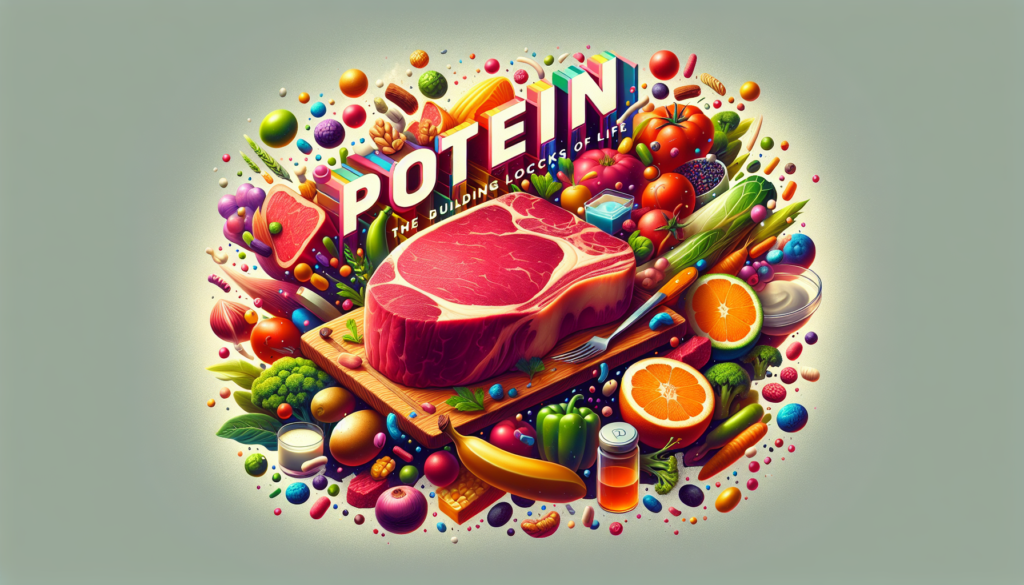Are you confused about how much protein you actually need in your diet? Well, you’re not alone! In this article, we will explore the fascinating world of protein and dive into the recommended daily intake for optimal health. Whether you’re a fitness enthusiast or simply curious about nutrition, this article will provide you with the essential information you need to make informed choices about your protein intake. So, let’s get started and uncover the truth about protein!

Factors that affect protein needs
Age
Age is an important factor that affects protein needs. As we age, our bodies undergo various changes, including a decline in muscle mass. This means that older individuals may require more protein to support muscle growth and maintenance. The recommended protein intake for older adults is higher compared to younger individuals.
Sex
Sex is another factor that influences protein needs. Men generally require more protein than women due to their typically higher muscle mass. Protein is essential for muscle growth and repair, and since men generally have more muscle mass, their protein requirements are higher.
Body weight and composition
Body weight and composition also play a role in determining protein needs. Individuals with higher body weights generally require more protein to support their muscle mass and meet their energy needs. Additionally, those with higher muscle mass may require more protein to support muscle growth and maintenance compared to individuals with lower muscle mass.
Activity level
The level of physical activity that you engage in also affects your protein needs. Athletes and active individuals, who regularly engage in intense physical activity, require more protein to repair and build muscle, as well as to aid in recovery. On the other hand, those who are less active may have lower protein requirements.
Overall health
Your overall health status can also impact your protein needs. Certain medical conditions, such as malabsorption disorders or kidney disease, may require adjustments in protein intake. Additionally, individuals recovering from surgery or injury may require increased protein intake to support tissue repair and healing.
Recommended dietary allowance (RDA) for protein
RDA for different age groups
The recommended dietary allowance (RDA) for protein varies depending on age. According to the National Academy of Medicine, the RDA for protein is as follows:
- Infants: 9-11 grams per day
- Children (1-3 years): 13 grams per day
- Children (4-8 years): 19 grams per day
- Children (9-13 years): 34 grams per day
- Adolescents (14-18 years): 52 grams per day (boys) and 46 grams per day (girls)
- Adults (19 years and older): 56 grams per day (men) and 46 grams per day (women)
RDA for men and women
As mentioned earlier, men generally require more protein than women due to their higher muscle mass. The RDA for protein for men is 56 grams per day, while for women it is 46 grams per day. It is important to note that these values can vary depending on individual factors such as activity level and overall health.
RDA for athletes and active individuals
Athletes and active individuals who engage in regular intense physical activity have higher protein needs compared to sedentary individuals. The protein requirements for athletes vary depending on the type, intensity, and duration of their activity. It is recommended that athletes consume approximately 1.2 to 2 grams of protein per kilogram of body weight per day to support muscle repair, growth, and recovery.
RDA for pregnant and breastfeeding women
Pregnant and breastfeeding women have increased protein needs to support the growth and development of the fetus or baby. The RDA for protein during pregnancy is 71 grams per day, while during breastfeeding it is 71 grams per day for the first six months and 71 grams per day for the remainder of the breastfeeding period.
RDA for older adults
Older adults have higher protein needs compared to younger individuals due to age-related changes in muscle mass and metabolism. The RDA for protein for adults over the age of 65 is 81 grams per day for men and 46 grams per day for women.
Calculating protein needs
Calculating protein needs based on body weight
One common method to calculate protein needs is based on body weight. The general recommendation is to consume 0.8 grams of protein per kilogram of body weight. For example, if you weigh 70 kilograms, your protein needs would be approximately 56 grams per day. However, it is important to consider other factors such as activity level and overall health when determining protein requirements.
Calculating protein needs based on activity level
If you are physically active or engage in regular exercise, your protein needs may be higher than the standard recommendation of 0.8 grams per kilogram of body weight. As mentioned earlier, athletes and active individuals may require 1.2 to 2 grams of protein per kilogram of body weight to support muscle repair, growth, and recovery. It is advisable to consult with a healthcare professional or registered dietitian to calculate your specific protein needs based on your activity level.
Protein requirements for different populations
Protein needs for children and adolescents
Protein is essential for growth and development in children and adolescents. The protein needs for this age group vary depending on their age and stage of development. Infants and young children have relatively higher protein needs compared to older children and adolescents. The RDA for protein for children (1-3 years) is 13 grams per day, while for adolescents (14-18 years), it is 52 grams per day for boys and 46 grams per day for girls.
Protein needs for men
Men generally have higher protein needs compared to women due to their higher muscle mass. The RDA for protein for men is 56 grams per day, but this can vary based on factors such as activity level and overall health. It is important for men to ensure they meet their protein needs to support muscle growth and repair.
Protein needs for women
Women require protein to support muscle growth and repair, just like men. The RDA for protein for women is 46 grams per day, but this can vary based on factors such as activity level and overall health. It is important for women to meet their protein needs to maintain muscle mass and support overall health.
Protein needs during pregnancy and breastfeeding
During pregnancy and breastfeeding, women have increased protein needs to support the growth and development of the fetus or baby. The RDA for protein during pregnancy is 71 grams per day, while during breastfeeding it is 71 grams per day for the first six months and 71 grams per day for the remainder of the breastfeeding period. It is important for pregnant and breastfeeding women to ensure they meet their protein needs to support the health of both themselves and their baby.
Protein needs for older adults
Older adults often experience age-related changes in muscle mass and metabolism. This can result in higher protein needs compared to younger individuals. The RDA for protein for adults over the age of 65 is 81 grams per day for men and 46 grams per day for women. Meeting protein needs is important for older adults to support muscle maintenance, overall health, and functional independence.
Protein needs for vegetarians and vegans
Vegetarians and vegans can meet their protein needs through plant-based sources. However, it is important for individuals following these lifestyles to ensure they consume a variety of protein-rich plant foods to obtain all the essential amino acids. Plant-based protein sources include legumes, tofu, tempeh, seitan, edamame, nuts, seeds, and whole grains. Combining different plant-based proteins can also help to enhance protein quality and ensure adequate intake.

Health benefits of adequate protein intake
Muscle growth and maintenance
Protein is essential for muscle growth and maintenance. Adequate protein intake, combined with regular physical activity, supports muscle protein synthesis and helps prevent muscle breakdown. By meeting your protein needs, you provide your body with the building blocks it needs to repair and build new muscle tissue.
Weight management
Protein has been shown to help with weight management and promote feelings of fullness. It has a higher thermic effect compared to carbohydrates and fats, which means that more energy is required to digest and metabolize protein. This can increase calorie expenditure and potentially contribute to weight loss or weight maintenance.
Bone health
Protein is important for maintaining bone health. It plays a role in the production of collagen, which is a major component of bone tissue. Adequate protein intake, along with sufficient calcium and vitamin D, is necessary for optimal bone health and may help reduce the risk of osteoporosis and fractures.
Immune function
Protein is involved in the production of antibodies, enzymes, and other molecules that support immune function. Adequate protein intake is essential for a healthy immune system, as it helps maintain the integrity and function of immune cells, allowing them to effectively fight off infections and protect your overall health.
Wound healing
Protein is crucial for wound healing. It is involved in the production of new tissue and collagen, which are necessary for proper wound closure and tissue repair. Adequate protein intake is essential for promoting optimal wound healing and reducing the risk of complications.
Satiety and appetite control
Protein has been shown to increase feelings of fullness and help control appetite. Including protein-rich foods in your meals and snacks can help you feel more satisfied and reduce the likelihood of overeating. This can be particularly beneficial for weight management and preventing excessive calorie intake.
Potential risks and consequences of inadequate protein intake
Muscle wasting
Inadequate protein intake can lead to muscle wasting or loss of muscle mass. When the body does not receive enough protein, it may break down muscle tissue to obtain amino acids, which are necessary for various bodily functions. This can result in muscle weakness, decreased mobility, and a higher risk of injuries.
Weakened immune system
Protein is essential for proper immune function. Inadequate protein intake can weaken the immune system, making you more susceptible to infections and illnesses. Without enough protein, the body may struggle to produce enough antibodies and immune cells, compromising its ability to defend against pathogens.
Slower wound healing
When protein intake is insufficient, the body’s ability to repair and rebuild tissues, including wounds, is compromised. This can result in slower wound healing and an increased risk of complications, such as infections. Adequate protein intake is crucial for optimal wound healing and recovery.
Increased risk of fractures
Protein plays a role in maintaining bone health and strength. Inadequate protein intake can increase the risk of fractures and osteoporosis, especially in older adults. Without enough protein, the body may have difficulty producing collagen, the protein that gives bone its structure and strength.
Decreased satiety and increased appetite
Protein is known to promote feelings of fullness and help control appetite. When protein intake is insufficient, it can lead to increased hunger and cravings, as well as a higher likelihood of overeating. This can contribute to weight gain and difficulties with weight management.
Common misconceptions about protein needs
High-protein diets for weight loss
One common misconception is that high-protein diets are necessary for weight loss. While protein can help with weight management and promote feelings of fullness, extremely high protein intake is not necessary or recommended for most individuals. It is important to follow a balanced diet that includes a variety of nutrients, including protein, carbohydrates, and fats.
Protein intake and kidney health
There is a misconception that high protein intake can be detrimental to kidney health. While excessive protein intake may put additional strain on the kidneys in individuals with pre-existing kidney conditions, moderate protein intake is generally safe for healthy individuals. It is important to consult with a healthcare professional before making any significant dietary changes, especially if you have kidney disease or other kidney-related concerns.
Protein intake and bone health
Another misconception is that high protein intake can negatively affect bone health. However, research suggests that moderate protein intake is not harmful to bone health and can actually be beneficial, especially when combined with adequate calcium and vitamin D intake. It is important to follow a balanced diet that includes sufficient protein, as well as other nutrients necessary for optimal bone health.
Protein intake and muscle mass in aging
There is a common belief that older adults require less protein as they age. However, research suggests that older adults may actually require higher protein intake to support muscle maintenance and prevent age-related muscle loss. Adequate protein intake, along with regular physical activity, is crucial for preserving muscle mass and functional independence in older adults.
Sources of protein
Animal-based proteins
Animal-based foods are rich sources of protein. Some common animal-based protein sources include meat, poultry, fish, eggs, and dairy products. These foods are considered complete proteins as they contain all the essential amino acids needed by the body.
Plant-based proteins
Plant-based foods can also provide ample amounts of protein. Some examples of plant-based protein sources include legumes (beans, lentils, chickpeas), tofu, tempeh, seitan, edamame, nuts, seeds, and whole grains. While plant-based proteins may be lower in one or more essential amino acids compared to animal-based proteins, combining different plant-based proteins can help ensure adequate intake of all essential amino acids.
Combining different plant-based proteins
Combining different plant-based protein sources can help enhance protein quality and ensure a complete amino acid profile. For example, combining legumes with grains (e.g., rice and beans) or legumes with nuts or seeds can provide all the essential amino acids the body needs. It is important for vegetarians and vegans to include a variety of plant-based protein sources in their diet to obtain all the essential amino acids.
Best practices for meeting protein needs
Balancing protein intake throughout the day
To meet your protein needs, it is important to distribute protein intake evenly throughout the day. Aim to include a source of protein at each meal and snack. This can help optimize muscle protein synthesis and support overall health. For example, include protein-rich foods like eggs, yogurt, or lean meats in your breakfast, lunch, and dinner. Snack on protein-rich foods like nuts, seeds, or Greek yogurt between meals.
Choosing high-quality protein sources
When selecting protein sources, choose high-quality options that provide essential amino acids and other important nutrients. Examples of high-quality protein sources include lean meats, poultry, fish, eggs, dairy products, legumes, tofu, tempeh, and Greek yogurt. These foods not only provide protein but also offer additional vitamins, minerals, and health-promoting substances.
Considering individual preferences and dietary restrictions
Consider your individual preferences and any dietary restrictions you may have when planning your protein intake. If you follow a specific diet, such as vegetarianism or veganism, ensure you include a variety of plant-based protein sources to meet your protein needs. If you have allergies or intolerances to certain protein sources, find suitable alternatives that still provide adequate protein.
Conclusion
In conclusion, protein is an essential nutrient that plays a crucial role in various aspects of our health. Factors such as age, sex, body weight and composition, activity level, and overall health determine our protein needs. It is important to meet our protein requirements to support muscle growth and maintenance, weight management, bone health, immune function, wound healing, and satiety. Inadequate protein intake can lead to muscle wasting, weakened immune system, slower wound healing, increased risk of fractures, and decreased satiety. It is important to dispel common misconceptions about protein needs, such as the belief that high-protein diets are necessary for weight loss or that high protein intake is harmful to kidney health. There are various sources of protein, including animal-based and plant-based options, and it is important to choose high-quality protein sources that provide essential amino acids and other vital nutrients. By considering individual preferences and dietary restrictions, balancing protein intake throughout the day, and consulting with healthcare professionals when necessary, we can ensure we meet our protein needs and promote optimal health.

